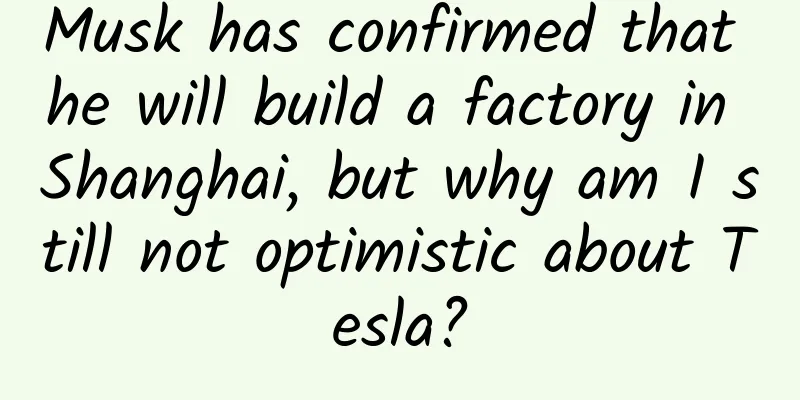Musk has confirmed that he will build a factory in Shanghai, but why am I still not optimistic about Tesla?

|
Tesla is finally here. On July 10, Tesla CEO Elon Musk confirmed in Shanghai that Tesla will invest $9 billion in China to build a Tesla Gigafactory that integrates R&D, manufacturing, and sales, with an annual production capacity of 500,000 pure electric vehicles. According to the plan, the factory will be completed as early as 2020. Many clear benefits The wholly-owned factory is undoubtedly a major positive for Tesla, and it is also one of the rare good news for Tesla in a while. As of the close of the 10th, Tesla's stock price rose 1.24% to $322.47. The 25% tariff imposed since July 6 has caused great pain for American-made cars, directly leading to a sharp price increase for Tesla models, which were already not cheap, and its sales prospects in China are bleak. When Tesla's Shanghai factory goes into production, production costs will inevitably drop significantly, which will undoubtedly improve Tesla's competitiveness in the Chinese market. However, since it is a wholly-owned factory in the free trade zone, Tesla still cannot avoid the 25% tariff. It is worth looking forward to that after Tesla is produced in China, a Model X priced at one million yuan can save 100,000 yuan in transportation and loading and unloading fees and purchase tax. In addition, China's comprehensive labor costs and manufacturing costs are much lower than those in the U.S. There are many auto parts companies in the Yangtze River Delta region, which is very helpful for Tesla to reduce parts procurement and transportation costs. However, despite the many favorable factors already on Musk's desk, he still believes that Tesla's prospects in China will not be bright if the following problems are not solved. Question 1: Where does the money come from to build a factory? It will take at least two years to build the factory. Currently, Tesla is still facing many difficulties. Tesla's future is still worrying. Building a factory is a major positive, but it is questionable whether Tesla has sufficient funds to build the factory. Tesla's latest quarterly report for 2018 showed that the company suffered a net loss of US$785 million during the period, an increase of 90% year-on-year. The threshold for the automobile manufacturing industry is high, largely because of the huge scale of investment. This time Tesla is building a factory in Shanghai Tesla is currently the benchmark in the new energy vehicle industry, but without the support of a large amount of US dollars, it is a question of how long this benchmark can last. Question 2: How to defend against low-dimensional attacks from traditional car companies? China is the world's largest auto sales market, and also the largest new energy vehicle market, which no automaker will ignore. Not only Tesla is investing heavily, but also major traditional auto giants are eyeing it. Tesla is undoubtedly a pioneer in the field of new energy vehicles. From the central control screen to remote software upgrades; from the development of electric vehicle platforms to the development of autonomous driving, Tesla has always played the role of a leader in the new energy vehicle industry. But Tesla has also paid a huge price for this. Large-scale R&D trial and error and the immaturity of the new energy vehicle market have made Tesla, a pioneer, unable to cope with the situation. Sales performance has never been able to break even, which has also caused Musk a lot of headaches. More importantly, the awakened traditional auto giants are trying to snatch Tesla's job. The strategies adopted by traditional auto giants in this round of new energy vehicle transformation are very stable. They have adopted a close-following strategy in terms of relevant technologies and vehicle model reserves. In other words, they have been cheating behind Tesla, closely tracking and iterating on the trends in the new energy vehicle industry, always ready, waiting for Tesla to make mistakes, waiting for the market to mature, and waiting to give Tesla the final fatal blow. Considering that new energy vehicles are still very dependent on subsidy policies and are difficult to make profits, traditional auto giants have rarely launched mass-produced new energy models. Tesla is different. It has been engaged in new energy vehicles from the beginning and it is impossible to steal the jobs of fuel car companies. Traditional car companies need to consider their own financial reports and will not bet everything on one vehicle like Tesla. It is impossible for traditional auto giants to make profits from electric vehicles in the short term, so on the one hand they are making intensive preparations for the same, while on the other hand they are holding back and waiting for the right opportunity. Traditional car companies are gathering their strength and waiting for the right opportunity to strike back, and that opportunity is - consumers' barrier-free acceptance of electric vehicles. By that time, automakers will return to competing on design, interior design, and cost, using these low-dimensional means to encircle Tesla, and Tesla will have no fundamental countermeasures. After all, these are the winning magic weapons that traditional manufacturers have used for hundreds of years. In fact, compared with BBA, Tesla is a latecomer in China's new energy vehicle market. BBA has already announced plans to build new energy vehicle factories in China. Considering the stronger resource integration capabilities and richer vehicle manufacturing experience of traditional giants, BBA is likely to produce new energy vehicles in China earlier than Tesla. Moreover, most of the new factories built by BBA are joint ventures, which will enjoy a series of preferential policies that Tesla cannot enjoy. All of this will bring a huge impact to Tesla. Question 3: Quality control and mass production, Tesla’s main concern The automotive industry has very high requirements for quality control, and the endless quality problems are a major flaw of Tesla. At the end of last year, Tesla factory employees and former employees revealed that 90% of Model S and Model X vehicles would be found to have problems after they came off the production line. Relevant personnel revealed that this data came from Tesla's internal tracking system in October, "Sometimes, there are even more than 2,000 new cars waiting to be repaired." Tesla's product quality has always been criticized, and the gap between door handles and body sheet metal, and problems with gull-wing doors are common. Coupled with Tesla’s mass production problems, it can be said that it is a problem that is born with it and is difficult to cure. In the last week of the second quarter of this year, Tesla finally completed the target originally scheduled for December 2017 six months later, achieving the goal of mass production of 5,000 Model 3 vehicles per week. After the news came out, Tesla's stock price rose by nearly 5% in one day. According to reports, in order to fulfill the mass production target, Tesla started a 7 X 24 three-shift system, and even set up tents outside the factory to expand a production line and skip some testing links to maintain the current production speed. Even so, Tesla only delivered 40,740 vehicles in the second quarter, lower than Tesla's expected 51,000 and the market's expected target of 49,000. Question 4: The losers in the field of autonomous driving At the beginning of the year, the US market research organization Navigant Research released the latest annual autonomous driving technology rankings. This ranking evaluates each company's autonomous driving technology and commercialization capabilities, and is a visual indicator of the autonomous driving technology level of major automakers. As we all know, Tesla's Autopilot has caused many accidents, some of which have caused deaths. Tesla's ranking is not surprising. Previously, Musk had vowed to launch L5 fully autonomous cars before 2019. Apparently, Musk overestimated his engineers. Tesla has been using its own self-driving system after parting ways with supplier Mobileye. New energy vehicles are a major change for the automotive industry, but ultimately they are just improvements in the power system. The advantages of electric vehicles are mainly environmental protection and reduced power costs. However, they cannot have an overwhelming advantage over fuel vehicles in terms of safety, comfort, acceleration, etc. No matter how the automotive industry changes, it still needs to provide a better user experience. Smart cars are directly related to the user's driving experience, and there is a lot of room for imagination. Once smart cars, represented by autonomous driving, mature, they will bring a qualitative improvement to the driving experience. The changes that smart cars will bring to traditional cars will be similar to the disruption of digital cameras to film cameras and smartphones to feature phones. Tesla's lag in autonomous driving shows that it has fallen behind traditional auto giants in the direction of smart cars. Tesla has always been innovative and is a respectable company, but the market has always been cruel and ruthless. Building a wholly-owned factory in China is good news for Tesla, but if Tesla wants to complete its own redemption, it still needs to solve too many other problems. There is not much time left for Tesla! As a winner of Toutiao's Qingyun Plan and Baijiahao's Bai+ Plan, the 2019 Baidu Digital Author of the Year, the Baijiahao's Most Popular Author in the Technology Field, the 2019 Sogou Technology and Culture Author, and the 2021 Baijiahao Quarterly Influential Creator, he has won many awards, including the 2013 Sohu Best Industry Media Person, the 2015 China New Media Entrepreneurship Competition Beijing Third Place, the 2015 Guangmang Experience Award, the 2015 China New Media Entrepreneurship Competition Finals Third Place, and the 2018 Baidu Dynamic Annual Powerful Celebrity. |
Recommend
120 pieces of experience on huge Qianchuan delivery, a must-read for novices!
Without further ado, let’s get to the point! 1. W...
How to become an excellent user growth operator
As a front-line user growth practitioner, what qu...
How do we “see” the brightest “fireworks” in the universe?
On October 9, 2022, there was a very shocking and...
An overlooked source of salt: mustard tuber
Salt is the most important condiment in life. In ...
Menopause occurs in both men and women? How to adjust your diet? What should you pay attention to in your life? Huaxi doctors say...
As the saying goes "When you reach middle ag...
With a low budget and high bid, how can you play Baidu bidding promotion?
Recently, I have sorted out several of the most f...
This ingredient should not be in food! It is endangering the health of billions of people
Fat is a substance that people love and hate. We ...
Does sleeping more when you have a cold really help?
After being infected with the Omicron strain of t...
A quick overview of the history of computers
Part 01 introduction The history of computer deve...
Xpeng Motors cuts its sales area in half, eliminates inefficient direct-sale stores, and accelerates its layout in second- and third-tier markets
According to multiple sources, Xpeng Motors has d...
Meizu 20 Pro review: Two years of hard work, a full-on "alien" flagship
For the mobile phone market and consumers, the Me...
Constipation destroys your body and makes you socially unwell! Huaxi doctors: It is not easy to poop freely
The joys and sorrows of mankind are not the same:...
Traffic war! How to deeply tap the value of long-tail channels?
"Channels are king" is an iron rule in ...
Guanghan SEO training: Explain that the ranking of a website to the homepage is inseparable from two factors: relevance and user search habits
Optimizing website keywords to the homepage throu...








![A comprehensive guide to App promotion and operation knowledge: [Data Analysis]](/upload/images/67cc3ef8ee6ff.webp)
